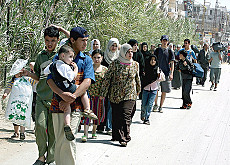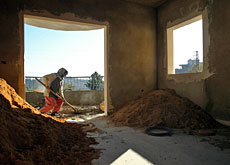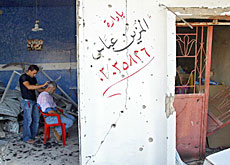Swiss works to bring hope to Lebanon

As tensions escalate in Lebanon, the former secretary-general of the Swiss finance ministry tells swissinfo of the potential of "the Switzerland of the Middle East".
Peter Grütter now works for communications firm Cisco Systems, one of five United States companies responsible for the “Partnership for Lebanon”, an initiative to help the people of Lebanon build a better future.
Sporadic gunfire erupted on Thursday inside the Nahr el-Bared camp where fighters from the al-Qaida-inspired Fatah Islam militant group were barricaded. They had refused an ultimatum by Lebanon’s defence minister to surrender or face a military onslaught.
Lebanon’s government appeared to be preparing itself in case the showdown sparks violence elsewhere in the country.
In a sign of the danger, a bomb exploded on Wednesday night in the Aley mountain resort overlooking the capital, Beirut. The blast, which injured 16 people, was the third in the area since Sunday.
swissinfo: What is the “Partnership for Lebanon”?
Peter Grütter: Since the mid-1990s the world economy has transformed and is becoming increasingly global and knowledge driven. Lebanon is lagging behind, denying many of its citizens access to a world of ideas, education and business connected to the rest of the world’s human network.
Access to information and knowledge has become a key factor for structural change, economic wealth and social stability. Broadband is the new economic infrastructure of the 21st century. A connected Lebanon will be very well-positioned to exploit many opportunities in areas such as tourism, health, education, trade, financial services, media, design, digital localisation and translation, logistics, business services, transport among many others.
A central aim of the “Partnership for Lebanon” is to help Lebanon unlock this future through a modern broadband infrastructure.
swissinfo: It’s an unusual career path – from working for the Swiss finance minister to leading a structural modernisation project in Lebanon. How did it come about?
P.G.: I have had a beautiful, profound and enriching personal relationship with the people and the culture of the Middle East for 17 years: my wife is Lebanese. Lebanon and Switzerland have many things in common. They share the experiment of a cross-cultural democratic nation state – although Lebanon has a much more explosive geopolitical environment than Switzerland.
Lebanon was long-time called the Switzerland of the Middle East. Exploiting its strategic location in the Eastern Mediterranean and its strengths as a nation of trade and exchange, Lebanon could again fully play its role as a melting pot and bridge between cultures to the benefit of all peoples of the region.
As secretary-general of the finance ministry, I said in all our reform programmes over the past ten years that change was an opportunity and not a threat.
swissinfo: How is the current situation in Lebanon – both politically and economically – and what are the development needs?
P.G.: The situation is difficult but I see many efforts from all involved parties to de-escalate the situation and to get out of the political deadlock.
Lebanese people are known for their entrepreneurial spirit, their creativity and their solution-orientated flexibility. These factors, combined with their strength in education, languages, trade and the widespread and successful Lebanese diaspora, places the country in a competitive position.
swissinfo: What are your priorities?
P.G.: It is all about connectivity and I want to repeat that a connected Lebanon can define a new paradigm for growth, creativity, trade, entrepreneurialism, peace and stability in the Middle East.
swissinfo: How optimistic are you about Lebanon’s future?
P.G.: If one country in the Middle East has the opportunity of a bright future, it is Lebanon. I am very upset about the latest news and the situation in Lebanon. I hope that all Lebanese will stand together and not allow foreign militias to destabilise the country.
swissinfo
Israel and Hezbollah militias fought a month-long war that ended in August last year.
Some 1,200 civilians died in the conflict, according to UN estimates. 15,000 homes as well as bridges and roads were destroyed.
The Lebanese authorities have estimated total damage to infrastructure at $3.6 billion.
Switzerland has contributed a total of $16 million to humanitarian aid efforts in southern Lebanon, including $3.2 million for the International Committee of the Red Cross (ICRC).
The Swiss government granted a special credit of $11.5 million for relief efforts. A further $4.4 million has been earmarked to help Palestinians in the Israeli-occupied territories.
On May 25 the Swiss Agency for Development and Cooperation (SDC) said the situation for Palestinian refugees in northern Lebanon was “dramatic” and it was donating SFr100,000 ($81,500).
Of that, $60,000 would go towards medical supplies and $20,000 towards 3,000 mattresses.
The head of the SDC in Lebanon, Freiderich Steinemann, said the situation was particularly bad in the “hopelessly overfull” Beddawi camp, which was holding most of the 20,000 people who had fled the Nahr el-Bared camp.
The Partnership for Lebanon is a collaborative effort designed to help the people of Lebanon build a better future.
Launched in December 2006, the partnership is led by five top US companies: Cisco, Ghafari, Intel, Microsoft, and the Occidental Petroleum Corporation.
Within Cisco, the programme to help Lebanon to recover was named “Create Hope”. The titles “US Lebanese Partnership Fund” and “Create Hope” have since been abandoned and the initiative is now known as “Partnership for Lebanon”.
Working through public private partnerships and with the Lebanese people, the Partnership is focused on expanding the reach of education and workforce training and education, creating jobs, building out the country’s technology infrastructure, and connecting communities and government.

In compliance with the JTI standards
More: SWI swissinfo.ch certified by the Journalism Trust Initiative












You can find an overview of ongoing debates with our journalists here . Please join us!
If you want to start a conversation about a topic raised in this article or want to report factual errors, email us at english@swissinfo.ch.